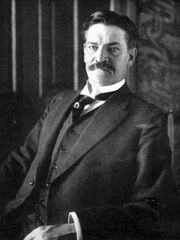No edit summary |
No edit summary |
||
| Line 1: | Line 1: | ||
[[File:Archibald_Gracie.gif|thumb|Colonel Gracie]]'''Colonel Archibald Gracie IV''' (January 15, 1858 – December 4, 1912) was an American writer, amateur historian and real estate investor. He was a first-class passenger on the [[RMS Titanic Liverpool|RMS ''Titanic'']] and survived the sinking by climbing aboard an overturned collapsible lifeboat. However, his health suffered as a result of the trauma and he died only a few months later, becoming the first adult survivor to die. |
[[File:Archibald_Gracie.gif|thumb|Colonel Gracie]]'''Colonel Archibald Gracie IV''' (January 15, 1858 – December 4, 1912) was an American writer, amateur historian and real estate investor. He was a first-class passenger on the [[RMS Titanic Liverpool|RMS ''Titanic'']] and survived the sinking by climbing aboard an overturned collapsible lifeboat. However, his health suffered as a result of the trauma and he died only a few months later, becoming the first adult survivor to die. |
||
| − | == |
+ | ==Aboard the ''Titanic''== |
| − | ===Aboard the ''Titanic''=== |
||
Gracie boarded the ''Titanic'' at Southampton on April 10, 1912 as a first-class passenger. |
Gracie boarded the ''Titanic'' at Southampton on April 10, 1912 as a first-class passenger. |
||
Revision as of 00:35, 6 September 2019

Colonel Gracie
Colonel Archibald Gracie IV (January 15, 1858 – December 4, 1912) was an American writer, amateur historian and real estate investor. He was a first-class passenger on the RMS Titanic and survived the sinking by climbing aboard an overturned collapsible lifeboat. However, his health suffered as a result of the trauma and he died only a few months later, becoming the first adult survivor to die.
Aboard the Titanic
Gracie boarded the Titanic at Southampton on April 10, 1912 as a first-class passenger.
On the evening of Friday 12, one of his brandy sessions was interrupted by an incident involving Caledon Hockley's fiancée, Rose DeWitt Bukater. Rose had been discovered in a state of distress at the bow of the ship, in the presence of a third-class passenger, Jack Dawson. Jack was arrested on the assumption that he had been trying to rape Rose. However, Rose claimed that Jack had saved her when she had been trying to view the propellers, and had leaned too far over. Gracie expressed his view that women and technology made a poor combination. When Jack agreed with Rose's story, Gracie commended him for his heroism, and suggested to Cal that he be rewarded in some way. With encouragement from Rose, Cal invited Jack to dine with them the following evening.
On Saturday 13, he dined with a large party including Ismay, Andrews, Molly, Cal, Rose and Jack. Jack informed the table of how he had won his ticket in a game of poker. Perhaps in defence of gambling Gracie asserted that "all life is a game of luck". When Jack was challenged by Rose's mother Ruth on his unconventional lifestyle, he expressed his opinion that life is a gift and each day matters. Gracie voiced his hearty approval of Jack's words. After dinner Gracie retreated with the other men into the smoking room. He invited Jack to join them, but he declined.
On the night of Sunday 14, the ship collided with an iceberg and began to sink, and the crew started to load the lifeboats. Halfway through the evacuation Gracie was approached by a frantic Rose, who asked if there were any remaining lifeboats on the port side of the ship. Gracie said no, but there were some left towards the bow on the starboard side. He offered to escort Rose there, but she and Jack ran away before be could say anything more.
Behind the scenes

The real Archibald Gracie in 1912
In James Cameron's 1997 film, Titanic, Gracie was portrayed by Welsh actor Bernard Fox. Fox had previously portrayed lookout Frederick Fleet in the 1958 film A Night to Remember. The Gracie in the film speaks with an incongruous British accent, despite the fact that he came from Alabama.
The real Gracie wrote a book about the disaster, which became popular and remains in print to this day.
External links
Archibald Gracie IV on Wikipedia